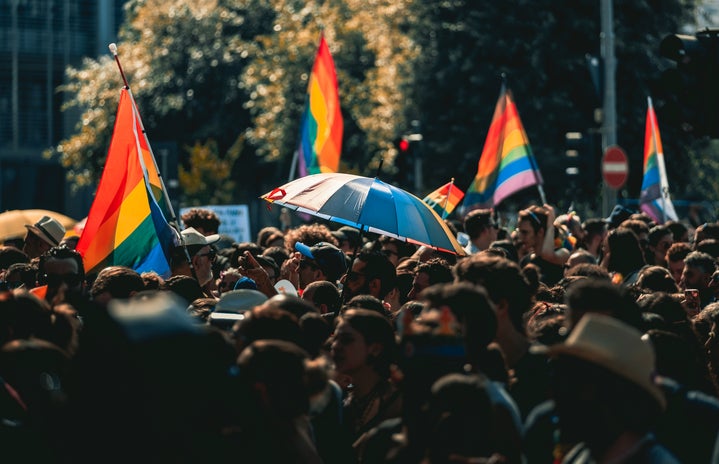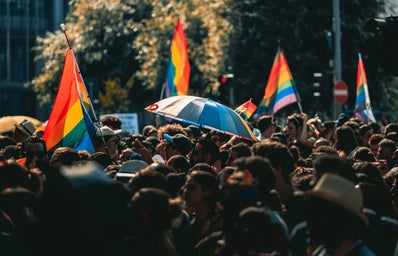LGBTQIA+ culture and history is something often neglected in school education or anywhere outside the LGBTQIA+ community. So even though June and the official Pride Month have come to an end, HCAU still wants to highlight some pivotal moments in history because, really, every month is Pride Month.
- Stonewall Inn Riots
-
Early on June 28, 1969, a police raid occurred at Greenwich Village’s Stonewall Inn—a bar that catered to gay, lesbian and transgender individuals.
The LGBTQIA+ community’s impulsive, violent and powerful response to police forcefully dragging employees and patrols out of the bar catalyzed the gay rights movement on a national and international scale.
The Stonewall Inn Riots lasted for six consecutive days and included protests and physical altercations with law enforcement. But the longer the riot persisted, the more joined the fight for equal rights in the gay community.
New York City in the 1960s deemed same-sex relations as well as serving alcohol to homosexual patrons at bars and clubs—often a place of refuge for the gay community—as crimes. So police raids were common on establishments like the Stonewall Inn. It wasn’t until 1966 that LGBTQIA+ customers could be served alcohol in bars and clubs, but this did not stop violent police raids.
The Stonewall Inn was a popular spot for drag queens and trans women (specifically trans women of color) who, even at a time when the LGBTQIA+ community was extremely discriminated against, were not always welcomed at other gay bars. The bar was also frequented by homeless and runaway gay youths.
Because the Stonewall Inn was a Mafia-run bar, cops typically left it, and others like it, alone thanks to bribes and secret deals between Mafia leaders and police departments. Cops would even tip-off the Mafia leaders before a raid would occur so they could stash the alcohol being served without a liquor license. The Stonewall Inn was even raided a few days before the historic Stonewall Riots.
The Stonewall Inn Riots were not planned and were not expected (as not one was tipped off beforehand). The police entered with a warrant, found the bootlegged alcohol and arrested 13 patrons and employees. Many of the patrons arrested violated New York’s gender-appropriate clothing statute and female officers forced cross-dressing individuals into the bathroom to check their sex.
Those at Stonewall that early morning in June stayed outside the bar as the events unfolded. One moment in particular is credited with beginning the riot. A lesbian was brutally hit over the head by an officer as he forced her into the police van. She then shouted for witnesses to act and the crowd began throwing whatever objects they had—pennies, bottles, stones—at the police. The riot had begun.
It is important to recognize that the Stonewall Inn Riots were not the first time the LGBTQIA+ community tried to rise up and fight against ongoing discrimination and persecution. However, Stonewall will forever be seen as the start to the modern-day fight for gay rights and equality.
Want to learn more about the powerful and proud people behind the Stonewall Inn Riots? Look up Marsha P. Johnson and Sylvia Rivera.
— Peyton Bigora
- Pride Parades
-
Pride parades are a staple of Pride Month. Every year, millions of people come together to march down the streets of the world’s most famous cities in support of the LGBTQIA+ community. These parades serve to celebrate LGBTQIA+ achievements and identities, and they also often allow people to demonstrate for social and legal equality.
The first pride marches were organized in June of 1970, just one year after the Stonewall Riots. The Chicago Gay Liberation put together a march in the city on Saturday, June 27, a nod to the fact that the Stonewall riots occurred on the last Saturday of June. The second march took place in Los Angeles the following day in the form of a parade.
Facing difficulties getting the permits they needed, the founders gave their organization the ambiguous name of “Christopher Street West”— referencing the street that the Stonewall Inn is located on- and teamed up with the ACLU to combat the “fees” that exceeded $1.5 million.
Ultimately, they succeeded in getting the permits they needed, and over 1,000 people reportedly showed up to march through Hollywood. New York also held a pride parade that day, coining the name “Christopher Street Liberation Day.”
The concept of Pride parades quickly caught on and, over the next few years, more and more cities organized their own. Today, millions of people every year get together and march for the LGBTQIA+ community.
Pride parades have become some of the most joyous and celebrated events over the past 50 years, and they’re one of the best ways to celebrate the LGBTQIA+ community and culture to the fullest.
–Nicole Scallan
- The Equality Act
-
Despite the many significant steps forward for the LGTBQIA+ community in the United States, queer Americans still lack the basic legal protections in states across the country. This is why in 2019, the bipartisan Equality Act was introduced in the House by Rep. David Cicilline (D-RI) and Brian Fitzpatrick (R-PA) and in the Senate by Sens. Jeff Merkley (D-OR), Susan Collins (R-ME), Tammy Baldwin (D-WI), and Cory Booker (D-NJ). The bill was met with 287 original cosponsors, which is the most congressional support that any piece of pro-LGTBQ legislation has received upon introduction.
The Equality Act was successfully passed in the House by a bipartisan vote of 236-173 on May 17, 2019.
However, the passing of the bill does not automatically fix the problem that is integrated into American law and government. Nearly two-thirds of LGBBQIA+ Americans report having experienced discrimination in their personal lives because federal law does not provide consistent non-discrimination protections based on sexual orientation or gender identity.
Everyone, regardless of gender and sexual orientation, should have a fair chance to earn a living and have a home without fear in America.
The Equality Act provides consistent, explicit non-discrimination protections for LGTBQ people in all aspects of life. This bill will amend existing civil rights law— such as the Civil Rights Act of 1964, the Fair Housing Act, the Equal Credit Opportunity Act, the Jury Selection and Services Act and several laws regarding employment with the federal government— to explicitly include sexual orientation and gender identity as protected characteristics.
This bill is just another reminder that when each of us steps into the voting booth or opens their absentee ballot, we must carefully research and choose the politicians that will continue to fight for equality among all Americans. Bills such as the Equality Act would not exist without our vote. To ensure equality, make sure to register to vote here.
— Christina McAlister
- Legalization of Gay Marriage
-
On June 26th, 2015, the Supreme Court struck down on all state-mandated bans on same-sex marriage, thus federally legalizing same-sex marriage.
This Obama-era mandate gave thousands of Americans the opportunity to eternalize their love in front of the law, the courthouse, friends and family.
Many have waited tirelessly for this moment in history, including Justice Anthony Kennedy. He wrote: “No longer may this liberty be denied. No union is more profound than marriage, for it embodies the highest ideals of love, fidelity, devotion, sacrifice and family. In forming a marital union, two people become something greater than once they were.” This historic majority opinion changed the proclamation of love in the LGBTQIA+ community and will forever live in infamy.
While the United States legalized same-sex marriage, there are myriad countries that have yet to join the movement. So far, only 30 out of 195 countries have legalized same-sex marriage, with most falling in the Western Hemisphere. The Human Rights Campaign is pushing wide range efforts across the world, with hopes to legalize same-sex marriage in all 195 countries. We are winning the fight, Happy Pride!
–Hannah Andress
- Landmark Supreme Court Rulings
-
Obergefell v. Hodges (2015) was a landmark Supreme Court case for LGBTQIA+ rights in the United States because, through this case, the Court upheld the right for same-sex couples to be legally married in the United States.
In this case, same-sex couples in the states of Ohio, Michigan, Kentucky and Tennessee challenged the constitutionality of the state’s refusal to recognize same-sex marriage and the some states’ outright bans on same-sex marriage.
The basis of the suit was that such laws were in violation of both the Equal Protections Clause and the Due Process Clause of the 14th Amendment. In a 5-4 decision, the Court held that the right to marry is a fundamental liberty guaranteed under the protections of the 14th Amendment, because it is inherent to the concept of individual autonomy and as a safeguard for children and families.
The Court found that the principles of equal protection under the law and those of liberty and equality should be applied with equal force in all cases, and therefore upheld the right of any individual to marry whomever they choose, irrespective of gender or sexual orientation.
Just this month, the Court delivered a fantastic win for civil rights advocates in the case of Bostock v. Clayton County (2020) by ruling that Title VII of the Civil Rights Act of 1964 provided protection against workplace discrimination for gay and transgender workers in the United States.
Title VII bars employment discrimination based on race, religion, national origin and sex; in this ruling, the Court determined that discrimination “because of sex” applies to gay and transgender individuals, which answered the defining question regarding the language of the statute.
Justice Neil Gorsuch wrote for the majority in the 6-to-3 ruling: “An employer who fires an individual merely for being gay or transgender defies the law.”
The ruling comes as a surprise to some, as Chief Justice Roberts and Justice Gorsuch traditionally rule in a manner more aligned with the conservative wing of the Court, but it has also been remarked that this ruling is a clear message that the highest Court in our nation should not and cannot be defined by partisan lines.
— Emma Semaan
Pride is now a celebration, but it didn’t start like that. It began with riots, violence and extreme oppression. It took hard work, acceptance, being knocked down as well as emotional and physical labor for generations. The history of the LGBTQIA+ community is vital, and so is recognizing the fight our Black brothers and sisters are going through now. Pride is a celebration because of Black trans women and so many others. Remember them as you fight for BLM and celebrate Pride.




